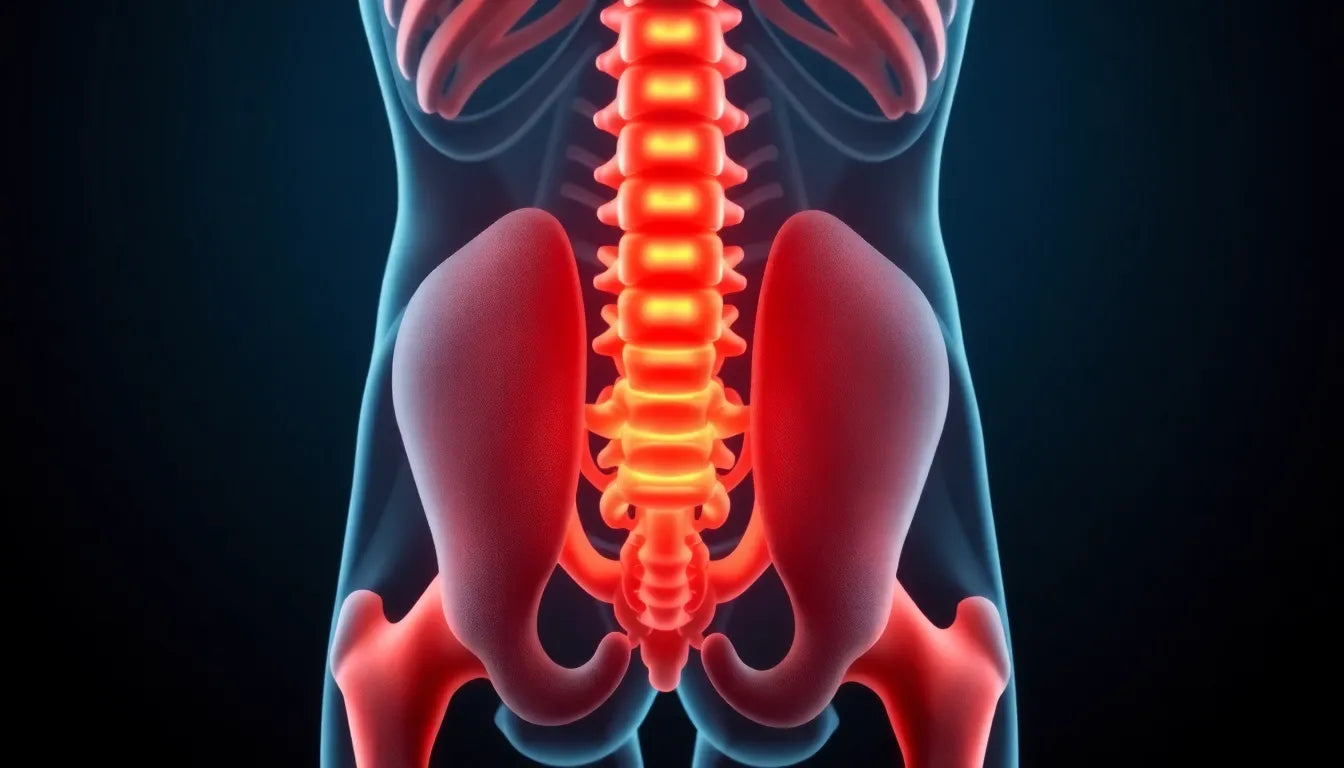Understanding the intricacies of spinal health is crucial, especially when it comes to conditions like herniated discs. A herniated disc occurs when the soft, gel-like center of a spinal disc pushes through a crack in the tougher exterior casing. This can happen due to aging, injury, or strain. While many people experience back pain at some point, the pressing question remains: can a herniated disc cause permanent nerve damage?
Understanding herniated discs
Herniated discs are a common spinal issue, often resulting from wear and tear or sudden injury. The spine is composed of vertebrae cushioned by discs that absorb shock. When a disc herniates, it can press on the nerves surrounding the spine, potentially leading to pain, numbness, or weakness in the limbs. Although permanent nerve damage from a herniated disc is rare, it is a possibility that warrants attention. Prolonged compression of nerves can escalate to severe outcomes, including sensory loss or even paralysis in extreme cases.
The importance of addressing the issue
For individuals experiencing back pain, understanding the risks associated with herniated discs is vital. Ignoring or mismanaging a herniated disc can lead to significant complications. In severe cases, individuals may face outcomes such as muscle weakness, loss of bowel or bladder control, or even paralysis. These potential risks underscore the importance of early detection and intervention. By recognizing symptoms early and seeking appropriate medical advice, individuals can mitigate these risks and maintain their quality of life.
This discussion sets the stage for a deeper exploration into the symptoms, risk factors, and preventive measures related to herniated discs. By arming yourself with knowledge, you can take proactive steps to protect your spinal health and prevent long-term complications. In the following sections, we will delve into the warning signs of herniated discs, the factors that contribute to permanent nerve damage, and the diagnostic and treatment options available to address this condition effectively.
Symptoms and warning signs of herniated discs
Recognizing the symptoms of a herniated disc is crucial for timely intervention. Common signs include localized pain in the affected area, often radiating to nearby regions. Patients may experience numbness, tingling, or muscle weakness, depending on the severity and location of the herniation. For instance, a herniated disc in the cervical spine may lead to symptoms in the shoulders and arms, while lumbar disc herniation often affects the legs and lower back.
It's important to be aware of cauda equina syndrome, a rare but serious condition resulting from extreme nerve compression at the spine's base. Symptoms may include severe lower back pain, loss of sensation in the lower body, and dysfunction of bowel or bladder control. Immediate medical attention is necessary to prevent permanent nerve damage.
Risk factors for permanent nerve damage
While permanent nerve damage from a herniated disc is uncommon, certain factors can increase the risk. Prolonged nerve compression is a primary concern, as it can lead to irreversible damage if not addressed promptly. Without timely medical intervention, the pressure on nerves may persist, exacerbating the condition and potentially leading to severe outcomes like sensory loss or paralysis.
Factors such as delaying treatment, inadequate management, or repetitive strain on the spine can exacerbate the risk of permanent damage. Therefore, it is essential to seek medical advice at the onset of symptoms to explore appropriate treatment options and minimize the risk of long-term complications.
Diagnostic techniques for herniated discs
Accurate diagnosis of a herniated disc is vital for effective treatment. Magnetic Resonance Imaging (MRI) is a commonly used diagnostic tool to visualize disc herniation and assess the extent of nerve compression. However, imaging results should be complemented with a comprehensive clinical evaluation to ensure accurate diagnosis, as discrepancies can sometimes occur between imaging findings and clinical symptoms.
Other diagnostic methods include physical examinations to assess reflexes, muscle strength, and sensory response. These evaluations help healthcare professionals determine the specific nerves affected and the severity of the condition, guiding the development of an effective treatment plan.
Prevention and treatment options
Preventive measures and early treatment are key to managing herniated discs and preventing permanent nerve damage. Conservative treatments, such as physical therapy, pain management, and lifestyle modifications, are often effective in relieving symptoms and promoting recovery. Physical therapy can strengthen the muscles supporting the spine, improve flexibility, and reduce pressure on the affected nerves.
In cases where conservative treatments do not provide relief, surgical intervention may be necessary to decompress the affected nerves. Surgical options, such as discectomy or laminectomy, aim to remove or repair the herniated portion of the disc, alleviating nerve pressure and preventing further damage.
Utilizing a flowchart to outline treatment pathways based on the severity of symptoms can be beneficial for patients to understand their options. Early detection and intervention are crucial in minimizing the risk of permanent nerve damage and ensuring a better quality of life for individuals with herniated discs.
Potential long-term effects of untreated herniated discs
Leaving a herniated disc untreated can lead to chronic conditions that significantly impact quality of life. One of the primary concerns is chronic pain, which can persist long after the initial injury. This ongoing discomfort may be accompanied by sensory deficits, such as numbness or tingling, which can become permanent if the nerve damage is severe.
Reduced mobility is another potential consequence of untreated herniated discs. As pain and nerve damage progress, individuals may find it increasingly difficult to perform daily activities, leading to a sedentary lifestyle and further health complications. In rare cases, damage to the sacral nerve roots can result in sexual dysfunction, adding another layer of complexity to the individual's health challenges.
Early detection and intervention are crucial in preventing these outcomes. By seeking medical advice at the onset of symptoms, individuals can explore treatment options that alleviate pain, restore function, and prevent permanent damage.
Preventive measures and lifestyle adjustments
Implementing preventive measures and making lifestyle adjustments can significantly reduce the risk of herniated discs and their complications. Here are some actionable tips to maintain a healthy spine:
- Practice good posture: Maintain an upright posture when sitting and standing to reduce strain on the spine.
- Use ergonomic furniture: Invest in chairs and desks that support proper alignment and reduce stress on the back.
- Exercise regularly: Engage in activities that strengthen core muscles and improve flexibility, such as yoga or Pilates.
- Lift properly: Use your legs, not your back, when lifting heavy objects to avoid injury.
- Maintain a healthy weight: Excess weight can increase pressure on the spine, so aim for a balanced diet and regular exercise.
These lifestyle changes can help prevent spinal issues and support overall health, reducing the likelihood of experiencing a herniated disc.
Conclusion
Throughout this blog, we have explored the complexities of herniated discs and their potential to cause permanent nerve damage. By understanding the symptoms, risk factors, and treatment options, individuals can take proactive steps to protect their spinal health. Early recognition of symptoms and timely medical intervention are critical in preventing long-term complications and ensuring a better quality of life.
Frequently asked questions
Can a herniated disc heal on its own?
In some cases, a herniated disc can improve with rest and conservative treatments like physical therapy. The body's natural healing processes can reduce inflammation and alleviate symptoms over time.
What are the signs that a herniated disc is getting worse?
Indicators of worsening conditions include increased pain, numbness, or weakness in the limbs. Loss of bowel or bladder control and severe pain in the lower back may also signal serious complications requiring immediate medical attention.
How long does it take to recover from a herniated disc?
Recovery time varies depending on the severity of the herniation and the treatment approach. Many individuals see improvement within weeks to months, but complete recovery can take longer, especially if surgical intervention is needed.
What lifestyle changes can help manage a herniated disc?
Engaging in regular exercise, maintaining good posture, and using ergonomic furniture can help manage symptoms. Additionally, avoiding activities that strain the back and maintaining a healthy weight are beneficial.
When should surgery be considered for a herniated disc?
Surgery may be necessary if conservative treatments fail to relieve symptoms, or if there is significant nerve compression causing severe pain, weakness, or loss of function. A healthcare professional can assess the need for surgical intervention based on individual circumstances.
Sources
- Barricaid Blog. (2023). "Can a Herniated Disc Cause Nerve Damage?"
- PubMed Central. (2022). "Systematic Review of Herniated Disc and Nerve Damage."
- American Association of Neurological Surgeons (AANS). (2023). "Herniated Disc."
- AICA Orthopedics. (2023). "Herniated Disc Symptoms and Treatment Options."
- New York Spine Specialist. (2023). "Herniated Disc and Nerve Damage."
























